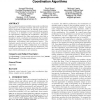189 search results - page 36 / 38 » Learning Automation Policies for Pervasive Computing Environ... |
ATAL
2008
Springer
13 years 9 months ago
2008
Springer
Due to computational intractability, large scale coordination algorithms are necessarily heuristic and hence require tuning for particular environments. In domains where character...
ICCBR
2001
Springer
14 years 5 days ago
2001
Springer
It is useful for an intelligent software agent to be able to adapt to new demands from an environment. Such adaptation can be viewed as a redesign problem; an agent has some origin...
SIGUCCS
2005
ACM
14 years 1 months ago
2005
ACM
Educational Partnerships and Learning Technologies (EPLT) [1] at the University of Washington maintains and supports a fleet of approximately 1,000 general-access student computin...
GECCO
2007
Springer
14 years 1 months ago
2007
Springer
Genetic Programming (GP) is an automated computational programming methodology, inspired by the workings of natural evolution techniques. It has been applied to solve complex prob...
EGICE
2006
13 years 11 months ago
2006
Abstract. In knowledge representation by fuzzy rule based systems two reasoning mechanisms can be distinguished: conjunction-based and implication-based inference. Both approaches ...

